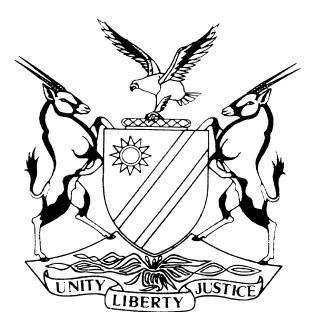1
NOT REPORTABLE 

HIGH COURT OF NAMIBIA MAIN DIVISION, WINDHOEK
REVIEW JUDGMENT
Case No: CR 26/2017
THE STATE
versus
MUKWAZO OWEN LIWAKALA ACCUSED
(HIGH COURT MAIN DIVISION REVIEW REF NO. 1528/2016)
(MAGISTRATE’S SERIAL NO. 178/2016)
Neutral citation: S v Liwakala (CR 26/2017) [2017] NAHCMD 83
(16 March 2017)
Coram: LIEBENBERG J et SHIVUTE J
Delivered: 16 March 2017

ORDER

The conviction as well as the sentence are set aside.

REVIEW JUDGMENT

SHIVUTE J ( LIEBENBERG J concurring):
[1] The accused person was convicted of assault with intent to do grievous bodily harm and sentenced to a fine of N$ 1000 or 6 (six) months imprisonment.
[2] I directed the following query:
‘The accused was convicted of assault with intent to do grievous bodily harm. How did the court satisfy itself that the accused admitted all the elements of the offence if he never admitted that his intention was to cause the complainant grievous bodily harm?’
[3] The learned magistrate replied:
‘The court was of the view that when the accused at the time of questioning in terms of section 112 (1) (b) of the Criminal Procedure Act 51/1977 as amended, the accused admitted that he assaulted the complainant with clinched fists on his mouth and nose three times, which resulted from an argument and furthermore, that the accused wanted or had the intention to cause the complainant to feel pain as the court was of the view that the question why entails reasoning and intention.’ (sic)
[4] The primary purpose of the questioning is to establish whether there is a reliable factual basis for the accused’s belief in his own guilt. It thus serves as a safety device against mistaken guilty pleas, particularly in respect of undefended accused, whose statements could alone found a conviction. In the case of S v M 1982 (1) SA 240 (N), Didcott J described the protective function of s 112 (1) (b) as follows:
‘The safety device is an important one. Accused persons sometimes plead guilty to charges, experience shows, without understanding fully what these encompass. The danger of their doing is so obvious in a society like ours which sees many who are illiterate and unsophisticated coming before the courts with no legal assistance…’
[5] The court must apply the section with great care and circumspection, especially where the accused is undefended and apparently unsophisticated. The court must establish whether the accused (i) admits every element of the offence and the factual allegations on which the elements are founded, (ii) admissions are a truthful reflection of his views and (iii) the reliability of such admissions.
[6] Furthermore, in the case of S v Tazama 1992 NR 190 HC at p 192, Frank J provided that:
‘Whereas the questions asked by the magistrate may well cover the question of intention it covers it in respect of common assault and not in respect of the special intention required in the present matter. After the accused was insulted he intended to assault the complainant. There is nothing to suggest he intended more than a common assault.’
[7] In the present case, the accused never admitted to have an intention to cause serious injury to the complainant, he only admitted to have the intention to cause the complainant to feel pain. The purpose to apply s 112 (1) (b) of the Act is to determine whether the accused admits all the elements of the offence, in other words the accused must give an unequivocal plea of guilty. The court cannot make inferences from the accused’s answers.
[8] In light of the above, I cannot agree that the offence as charged was satisfied in this matter and the conviction cannot be allowed to stand. Seeing that the accused has already served the sentence imposed, I see no reason to remit the matter back.
[9] In the result, the following order is made:
The conviction as well as the sentence are set aside.
_____________________
N N Shivute
Judge
______________________
J C Liebenberg
Judge